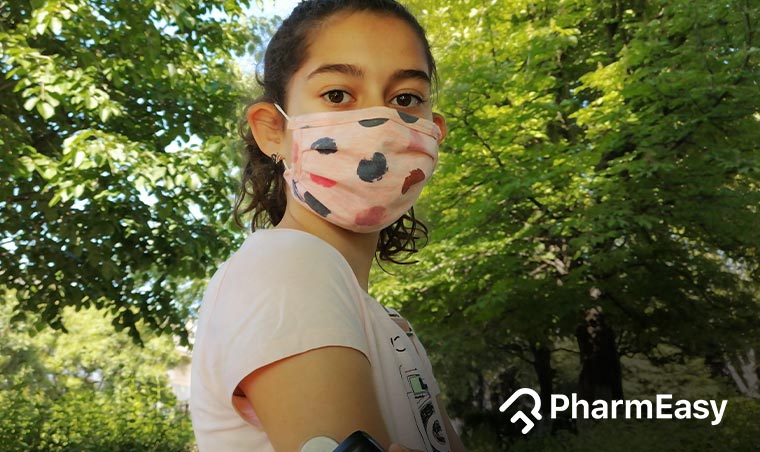Impact Of Diabetes On Child’s Psychology
By Shreya Gupta +2 more

Get more insightful and
helpful tips to
treat Diabetes for FREE



Download PharmEasy App




Register to Avail the Offer
Send OTPBy continuing, you agree with our Privacy Policy and Terms and Conditions
By Shreya Gupta +2 more
Diabetes is a health condition that can affect people from all age groups. There are many types of diabetes but we will be talking about the two commonly known types of diabetes, namely, Type 1 and Type 2 diabetes. Type 1 diabetes is predominantly observed in children and adolescents, while Type 2 diabetes is more common among adults and can also affect children. It is not just a physical condition. Diabetes and the mental health of a person are closely related.

Table of Contents
Juvenile diabetes or Type 1 diabetes is a type of diabetes diagnosed in children and young adults. But the recent trends have also shown that an increasing number of young adults and adolescents are being diagnosed with Type 2 diabetes as well.
When a child is detected with diabetes, it brings about several changes in their lifestyle and health. Individuals with diabetes not only experience physical changes but certain emotional and mental health issues too. Diabetes-related stress manifests as behavioural issues in children, young adults and parents in the form of anxiety, stress and mood swings.
A 2014 study published by the American Diabetes Association shows that really high blood sugar (hyperglycemia) can slow the growth of a brain as it develops. The same is true when a child’s levels swing up and down a lot. Brain scans show differences between a child with diabetes and one without.
Dr. M.G. Kartheeka, MBBS, MD
Children with diabetes often feel that they are different from the rest of their peers. At school, they might have to visit school teachers/medical staff for insulin injections, medicines or testing blood sugar levels, making them feel uncommon or isolated.
Most children and young adults visit parks, malls, food joints, summer camps and sleepovers but children with diabetes are often denied participation in such activities because the parents are constantly worried about their child’s health.
There is a correlation between diabetes and depression. Some studies state that children with diabetes are at increased risk of developing depression. About 15 – 20% of adolescents with diabetes experience diabetes-related depression.
They often feel sadness, irritability, lack of concentration, lethargy, sleep disturbances, appetite changes, low motivation, decreased participation in activities and thoughts about suicide.
Diabetes burnout is a state of low self-esteem, lack of motivation or what can be called diabetes distress. A state of mind where a person feels frustrated with managing the blood sugar levels, feeling dragged down by carrying out all the daily diabetes management tasks or feeling lonely for experiencing diabetes. It often leads to depression associated with diabetes.
Diabetic depression in children and young adults often results in poor health outcomes such as poor diabetic control, increased hospital visits, low confidence, poor quality of life and low self-efficacy, a belief that they are unable to control their diabetes well.
At an age of carefree playfulness, managing diabetes, monitoring blood sugar levels and maintaining several restrictions to keep diabetes in check can be stressful for children and adolescents.
The scheduled hospital and clinic visits for diabetic care, monitoring the associated risk and complications and reducing the risk of or preventing the other infections by maintaining a healthy immune system can get too overwhelming. Hence, diabetes and stress go hand in hand in children.
It is a disorder characterised by abnormal eating behaviour such as binge eating or restricting food intake.
Dietary restriction often makes people with diabetes too conscious about their weight, body and food intake. This practice of decreasing the food intake, increased daily exercise for maintaining body weight often results in punishing the body.
You may observe signs such as weight loss, vomiting, increased frequency of defecation post-meal, restrictive eating, binging, skipping meals, etc.
Diabetes can be a psychologically challenging health condition. Thus, implementing the most appropriate coping strategies can help maintain the mental health of kids with diabetes.
Parents of diabetic children should stay in constant touch with their kids’ teachers and inform them about the child’s health condition. They should also guide the teacher about managing strategies in case a diabetes-related health emergency arises at school.
If you notice any change in your child’s behaviour, you must also contact a child psychologist. The professionals from the team of mental health services can guide you and help you develop positive coping strategies to manage diabetes-related mental health issues of kids.
Children and young adults with diabetes need extra care to cope with the mental stress of diabetes as diabetes is associated with many physical and psychological challenges. Some seem to cope up easily, while others find it difficult. Thus, caregivers and children with diabetes should be vigilant about the mental health issues accompanying diabetes.
Disclaimer: The information provided here is for educational/awareness purposes only and is not intended to be a substitute for medical treatment by a healthcare professional and should not be relied upon to diagnose or treat any medical condition. The reader should consult a registered medical practitioner to determine the appropriateness of the information and before consuming any medication. PharmEasy does not provide any guarantee or warranty (express or implied) regarding the accuracy, adequacy, completeness, legality, reliability or usefulness of the information; and disclaims any liability arising thereof.
Links and product recommendations in the information provided here are advertisements of third-party products available on the website. PharmEasy does not make any representation on the accuracy or suitability of such products/services. Advertisements do not influence the editorial decisions or content. The information in this blog is subject to change without notice. The authors and administrators reserve the right to modify, add, or remove content without notification. It is your responsibility to review this disclaimer regularly for any changes.
Comments